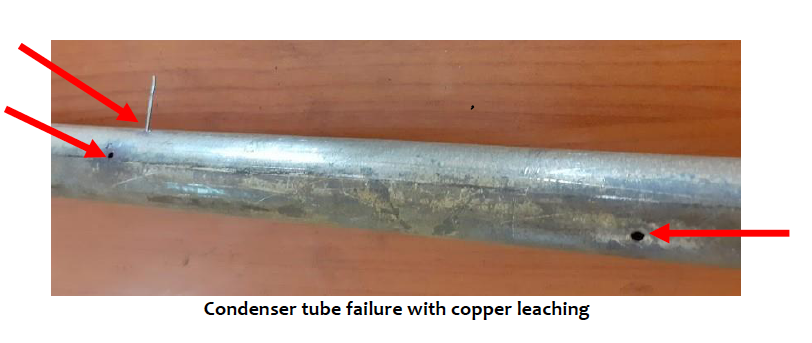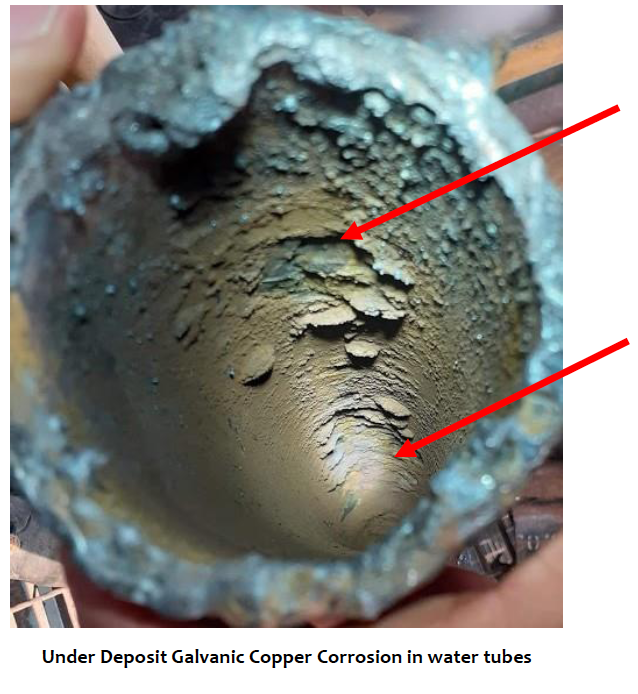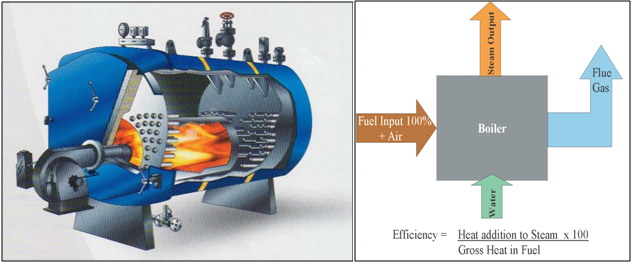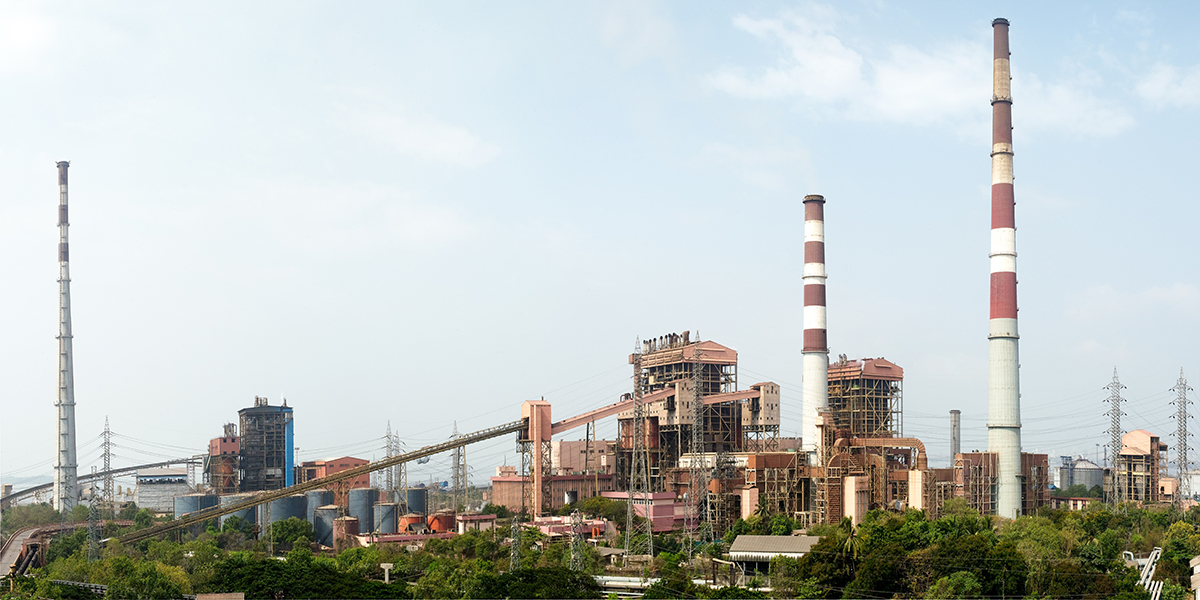Problem:
The selection of a water chemistry program is very crucial for power plants and needs to take care of metallurgy of water and steam circuit & MOC of heat transfer equipment like a condenser and HP/LP heaters. Water treatment may affect the boiler pressure parts, turbine blades and cooling tower water circuit. It will deteriorate the performance of the boiler, turbine and overall performance of the power plant.
Normally, a boiler manufacturer will recommend the parameters based on the working pressure of boilers and accordingly water treatment program is selected. It needs to be planned based on the MOC of heat exchangers in the steam and water circuit. A higher pH value of steam condensate will be prone to copper leaching in contact with ammonia in condensing power plant which has a tube material as admiralty brass. The problem can be analysed in two parts based on its effect on the turbine and boiler:
1. Frequent condenser tube leakage due to copper leaching – downtime of the turbine, deposition on turbine blades. That can reduce turbine efficiency and the maximum load that the unit can produce
2. Frequent Boiler tube leakage in water wall area due to galvanic corrosion of dissimilar metals in contact
.

A. COPPER LEACHING:
The common metals are not affected by anhydrous ammonia. But, even if there is little moisture, ammonia will react rapidly with copper, brass, zinc and many alloys, especially those containing copper and corrode them. Besides, moist ammonia will not react with iron or steel.
Copper alloy corrosion in the power industry has been studied in-depth due to problems with copper deposits on the high-pressure (HP) turbine that reduced turbine efficiency and output from the power plant.

Zinc-containing brass alloys such as admiralty brass are particularly susceptible to attacks from ammonia vapours. This can result in ammonia induced SCC on the steam side of the condenser or feedwater heater. The same alloys are susceptible to a mechanism termed “ ammonia grooving” where steam and ammonia condense on the tube sheet and support plates of the feedwater heater and run over the tubes, creating a narrow group of corrosion directly adjacent to the tube sheet or support plate. Copper alloys containing nickel are far less susceptible to ammonia-induced SCC.
Admiralty brass alloys have the additional concern of corrosion of zinc in the alloy due to low-pH conditions in the feed water or steam. Over time, the zinc can leach from the brass matrix, leaving only the copper sponge, which has little structural strength. This mechanism is called dezincification. Although not as common, copper- nickel alloys can also suffer from dealloying.
Copper leaching happens by its reaction with high concentration of Ammonia on condenser tube.
- Which results into weakening of the condenser tubes, and frequent down time of the Turbine.
- After copper leaching from admiralty brass tubes, metal thinning happens. The left out Zinc Metal remains will be brittle in nature, and Leaks condenser tubes with even load jerk on the Turbine.
- Also, copper from tubes will pass to the deaerator and fed to the boiler and will remain in the steam and water circuit.
- During condenser tube leakage, ingress of cooling water into condenser and mixes with condensed water causes contamination. Which will thereafter increase the silica level of Condensate water.
- Silica ingress in feed water of boiler circulates inside the pressure parts of boiler and starts deposit on the turbine blades.
- Due to the Gradual deposition of silica on the turbine blades at high speed RPM, it may not create any vibration issues.
- On increase of the layers of silica on turbine blades, it will reflect on increasing wheel chamber pressure. Which will lead to reduction in power output from turbine.
- On attempting wet steam washing at a saturation temperature at lower RPM, it will clear off Silica from the surface of blades of HP Stages.
- Cleared off silica may tend to redeposit on LP stages stationery blades.
- With the clearing of HP stages deposition, will be getting reduction of wheel chamber pressure and increase in power output from turbine.
- Due to the Reduction in power generation and unbalance of steam distribution it is difficult to match process steam demand and results in loss of power generation.
- During overhauling, You will find that the deposition of heavy silica scale on turbine stationary blades of IP and LP stages has reduced the steam path gap which restricts the steam flow to the condenser.
- Remove Turbine Scale with glass bid blasting of turbine rotor and stationary guide blades followed by Balancing of Rotor at high speed.
- In such cases, Complete set of condenser tubes needs to be replaced.
B. GALVANIC CORROSION:

Now, what is galvanic action? If we take two pieces of metal, one of a kind easily oxidizable, or that which has a great affinity for oxygen, and the other of a kind less oxidizable and plunge them into an acidulated liquid, we shall find that chemical action will take place and they will corrode in proportion to their respective affinity for oxygen. If now, we connect them together with a piece of metal outside the liquid or permit them to touch under the liquid, we shall find that the action will be almost wholly confined to the more oxidizable of the two metals, the other being practically unaffected. Thus, if we use plates of iron and copper for the two metals, we shall find that, if contact between them is maintained, the iron, which is the more oxidizable metal, will be the one to suffer from the oxidation, the copper not being affected at all.
Experiment:
To ascertain the comparative effect of copper, brass, tin, lead and white lead placed in contact with discs of iron in a boiler, also iron and zinc and iron alone, when immersed, loss with copper: 1.78 per cent, with brass: 1.89 per cent, tin: 1.51 per cent, sheet lead: 1.69 per cent, white lead: 3.14 per cent, iron and zinc: 0.52 per cent and iron alone: 1.58 per cent of metal of half the size of the iron plates with the duration of trial being six months and copper and brass having more corrosive effect than other metals when in contact with iron.
Plates of metal of half the size of the iron plates, duration of trial six months. Copper and brass having more corrosive effect than other metals when in contact with iron.
- Dissolved copper from condenser tubes circulates in the steam and water circuit and gets deposited on the water walls of boiler.
- Copper will concentrate in the Boiler furnace under high temperature zone of the water walls.
- Copper deposited on internal surface of water tubes, reacts with alloys and under deposit galvanic corrosion takes place inside water tubes surface.
- It causes Eating away of alloy metals at bottom of the deposition. Thinning of tube takes place, and metal becomes brittle.
- Thus, brittle portion of the tubes will tear off while cooling of the surface takes place. Chances of tube failure will be more during thermal temperature difference.
- You can observe copper deposits on each area of steam circuit boiler tubes, valves, steam path and turbine blades.
- After streamlining of water chemistry, Identification of tubes having galvanic corrosion and resolving the Boiler tube leakage problem is a challenge.
- Water chemistry program with prescribed range according to MOC of the Heat Exchangers, will improve life of the equipment and Power output.
References
- Corrosion and incrustation Steam Boilers by Mr K L Murray.
- https://www.researchgate.net/publication/ 273440731_Ammoniacal_leaching_and_recovery_of_copper_from_alloyed_lo w-grade_e-waste
Anil D. Vyas, Founder, ADV PowerCon, Energy & Power Plant Consultancy Services.





Kamlesh Kumar Shukla
July 22, 2021 at 11:48 amVery use full document for power plant selection of water chemistry.
Regards,
K. D. Shukla
R.M.Jadeja
July 22, 2021 at 5:11 pmGood article for power plant professionals.
Self do have useful presentations on CFBC Boilers, Water Chemistry, MOC selection for various zone of boiler, turbine, valves etc
JAIDEV MEHTA
July 26, 2021 at 9:56 amNice and much relevance..
JAIDEV MEHTA
July 26, 2021 at 9:57 amVery nice & relevance..
Vikas Mitharam Mandwade
July 28, 2021 at 2:47 amDer sir ,
Thanks for sharing knowledge regarding water chemistry very useful for us ,
We required knowledge regarding
1) condensate polish system, it is economical or not .
2) Zero discharge effluent water
Vikas Shinde
August 1, 2021 at 11:02 amVery good insight on the water chemistry and it’s effects on the Moc. It’s a very useful and excellent article, which I believe is an outcome of many years of hands on experience at various levels in Power generation industry. Thank y